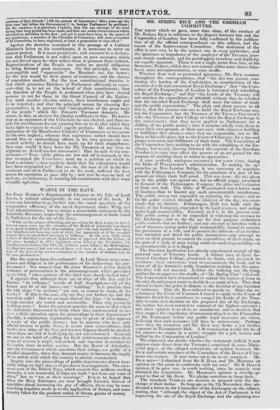WASTE IN THE NAVY.
SIR ;Tons BARROW'S Supplemental Chapter to his Life of Lord Assoc, is noticed subsequently, in our account of the book. It is not our intention to go further into the vexed questions of the comparative efficiency of the naval department under Whig and Tory administration ; but we notice a remarkable statement by the Admiralty Seetetary respecting the mismanagement of funds voted by Parliament for the use of the Navy.
" While on the subject of building and preserving the fleet, it may be statrd, that not many years ago the attention of the Board of Admiralty was drawn to ihe great numbers ot• new ships building, and with such rapidity, that they wrre launched, not from any want of ships, but apparently as if for no other istrpose titan to rot at their moorings itt ordinary. In the vunr 1; 432, when matters of this bind were closely fouled into, it appeared th.at the Nvh:011, of 129 guns, launched in 181% (eighteen years beti,re,) the Vindictive, 74, (nineteen years hetiree,) the Pitt, 74, (sixteen years before,) the Bellerophon, td. (finirteen years,) had not one of them ever been at sea ; and that other trip; of the line, in the several ordinaries, to the number of sixteen, were in the sante predicament."
has the system been discontinued? Is Lord Misr° more scru- pulous and diligent in the perlbrinance of his duties than his pre- decessors ? We suspect that Sir JOHN BARRow's tables furnish evidence of perseverance in the mismanagement which prevailed up to 1832, " when matters of this kind were closely looked into."
It appears that although there are 58 ships of the line and 74 frigates " in ordinary," vessels of both descriptions-12 of the limner and 10 of the latter—are " building." Is it possible that the 132 ships " in ordinary " are not, or cannot be made, lit for service ? If this is the case, why are they not broken up and the materials sold ? But we presume that of the ships " in ordinary," a large number are sound and serviceable. Then why persist in building more ? Is not the present practice the same as that which the Admiralty discovered in 18:32, when they condescended to be- stow a little attention upon the proceedings in their department ? Possibly, a satislactory explanation may be given of what appears a waste of the public money; but to persons who have only official returns to guide them, it seems most extraordinary, that twelve new ships of the line and ten new frigates should be needed, when there are 132 of both lying by, not commissioned. Generals are not in the habit of calling for fresh rehareements when their corps of reserve is ample, untouched, and superior in numbers to the entire force in active service. But the Board of Admiralty, and the Governinent which sanctions their doings, are guilty of a parallel absurdity, when they demand money to increase the supply of an article with which the country is already overstocked.
Inquiry into the proceedings of public departments almost inva- riably brings to light abuses of greater or less magnitude. The enor- mous cost of the British Navy, which exceeds five millions sterling annually, is not wonderful, if ships are built " not from any want of ships," but to " rot at their moorings." It is to be hoped that when the Navy Estimates arc next brought forward,. instead of squabbles about increasing the pay of officers, there may be souse searching inquiries made as to the application of former, and some security taken for the prudent outlay of future, grants of money.


























 Previous page
Previous page